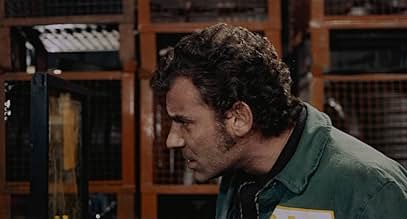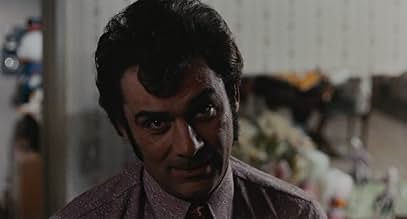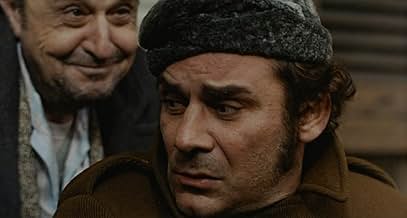IMDb RATING
7.6/10
4.3K
YOUR RATING
A conscientious factory worker becomes embroiled in political activism after accidentally cutting off his finger while working a machine.A conscientious factory worker becomes embroiled in political activism after accidentally cutting off his finger while working a machine.A conscientious factory worker becomes embroiled in political activism after accidentally cutting off his finger while working a machine.
- Awards
- 7 wins & 4 nominations
Nino Bignamini
- Salvatore Quaranta
- (as Giovanni Bignamini)
- Director
- Writers
- All cast & crew
- Production, box office & more at IMDbPro
Storyline
Did you know
- TriviaElio Petri's "La classe operaia va in paradiso" shows a very subtle cameo of Ennio Morricone, who also composed the original score of this film, awarded with a Palme d'or in the 1972 Cannes Film Festival. The Italian Maestro appears in close-up for almost one minute as the anonymous--and obviously uncredited--blue-collar who actions the cart, with both hands up and down, at the end of the assembly line in the factory. His repeated gesture immediately activates the "mechanical" music that announces the end titles.
- Quotes
Lulù Massa: If you want my food, take it. I'm not hungry, I've a rift in my stomach.
- ConnectionsFeatured in Italian Gangsters (2015)
Featured review
"The Working Class Goes to Heaven" stars Gian Maria Volonté, who appeared in earlier Elio Petri films like "We Still Kill the Old Way" and "Investigation of a Citizen Above Suspicion." The Marxist director's critique of capitalist society is at play in this movie as in so many of his others. Volonté plays Lulù Massa, a lathe-operator in a Milan factory which pays by piece work. Lulù is a fast worker, the pride of the management and the bane of the workers who consider him a threat. The work is a nightmare of monotony, and the workers are continually timed and fined for underproduction. "Even a monkey could do this work," Lulù says.
Like the comic tramp in Charlie Chaplin's 1935 "Modern Times," he feels dehumanized, exploited, empty. His relationship with his mistress and her TV-mesmerized son is strained. He asks an older friend in an insane asylum, "How did you know you were going mad? A man has a right to know what he is doing, what he's useful for."
At the end of the conversation with his mad friend (Salvo Randone) at the asylum, the man begins to leave and Lulù inadvertently remains. The insane asylum seems normal, while the factory, the "real" world, appears insane.
Lulù ignores the worker movement and strikers until he loses a finger in an accident while carelessly overworking. He becomes a symbol for the ills of the factory, and a radicalization process ensues until he is fired for taking a stand against the managers.
Eventually re-hired and given a demeaning assembly-line job, he daydreams enviously of his friend in the madhouse.
Gian Maria Volonté gives the beleaguered hero a pathetic and comic dimension which is always convincing, performing with bold strokes rather than by subtle illumination. Petri's directorial technique uses a similar approach. A highlight is an uproarious scene of lovemaking in a Fiat with co-worker Mieta Albertini.
The film won the grand prize at Cannes in 1972. It runs two hours in its full version and 1½ hours in a truncated version peculiarly called "Lulu the Tool." It is a major Italian film from the 1970s.
Like the comic tramp in Charlie Chaplin's 1935 "Modern Times," he feels dehumanized, exploited, empty. His relationship with his mistress and her TV-mesmerized son is strained. He asks an older friend in an insane asylum, "How did you know you were going mad? A man has a right to know what he is doing, what he's useful for."
At the end of the conversation with his mad friend (Salvo Randone) at the asylum, the man begins to leave and Lulù inadvertently remains. The insane asylum seems normal, while the factory, the "real" world, appears insane.
Lulù ignores the worker movement and strikers until he loses a finger in an accident while carelessly overworking. He becomes a symbol for the ills of the factory, and a radicalization process ensues until he is fired for taking a stand against the managers.
Eventually re-hired and given a demeaning assembly-line job, he daydreams enviously of his friend in the madhouse.
Gian Maria Volonté gives the beleaguered hero a pathetic and comic dimension which is always convincing, performing with bold strokes rather than by subtle illumination. Petri's directorial technique uses a similar approach. A highlight is an uproarious scene of lovemaking in a Fiat with co-worker Mieta Albertini.
The film won the grand prize at Cannes in 1972. It runs two hours in its full version and 1½ hours in a truncated version peculiarly called "Lulu the Tool." It is a major Italian film from the 1970s.
- ItalianGerry
- Jun 4, 2004
- Permalink
- How long is The Working Class Goes to Heaven?Powered by Alexa
Details
- Runtime2 hours 5 minutes
- Sound mix
- Aspect ratio
- 1.85 : 1
Contribute to this page
Suggest an edit or add missing content

Top Gap
By what name was The Working Class Goes to Heaven (1971) officially released in Canada in English?
Answer



























